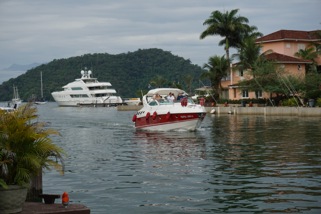[Savage Minds is pleased to run this essay by guest author Donna Goldstein as part of our Writer’s Workshop Series. Donna is Associate Professor of Anthropology at the University of Colorado. She is the author of Laughter Out of Place: Race, Class, Violence, and Sexuality in a Rio Shantytown (University of California Press). She is currently writing about pharmaceutical politics, bioethics, regulation, and neoliberalism in Argentina and the United States, and is investigating the history of genetics, Cold War science, the health of populations, and the future of nuclear energy in Brazil.]
“Going through the Brazilian Portal. Hold on! We are heading into Porto Frade, a gated community of the rich and wealthy! Everything functions here!” These are the words of my Brazilian research co-pilot, Nelson Novaes Pedroso Junior, during our recent field excursion to Angra dos Reis to explore perceptions of risk and the role of the nuclear energy plants in the region. Together with doctoral candidate Meryleen Mena, our research team entered Porto Frade, a securitized community not far from the Angra I and II nuclear complex in the state of Rio de Janeiro, Brazil. It is a gated community and a world of yachts, million dollar homes, mostly empty streets (in March of 2015, at least), and security apparati just within the five-kilometer mark of the emergency evacuation plan of the nuclear plant.

This is not only a less well-known Monaco or Sausalito, but also a community of second homes that are underutilized by their wealthy Brazilian owners. The homes are perfect, the gardens well-kept, and the yachts are supersized. In Porto Frade you can find restaurants with French names and menus that would please the most discerning cosmopolitan foodie. If I had no social conscience at all, I could probably have enjoyed my late Saturday lunch that much more. But knowing a tiny bit more about the broader context made enjoyment somewhat difficult. One needs a good sense of humor and sense of the absurd to work in Brazil and to write about its contradictions. Continue reading